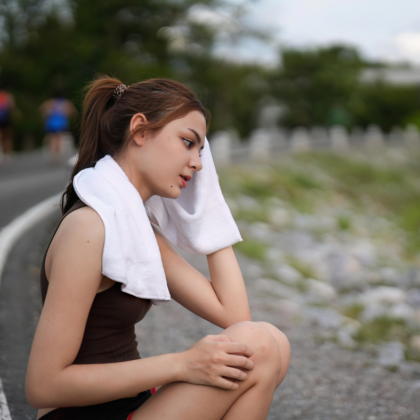Bad Body Odour in Teens and Adults:
Can Chinese Herbal Medicine do anything?
Body odour is a common concern for many people, affecting teens and adults alike. Although it's a natural part of human physiology, persistent or unpleasant B.O. can negatively impact self-esteem and social interactions. This blog post will explore the causes of body odour in teens and adults, delve into why some individuals smell stronger than others, and examine if Chinese Herbal Medicine can do anything about it.
Why Do Teens Experience Bad Body Odour?
Teens often experience noticeable changes in body odour due to the hormonal changes associated with puberty. These trigger increased activity in the sweat glands, leading to the development of stronger body odours. Specifically, there are two types of sweat glands involved:
- Eccrine Glands: These glands are distributed throughout the body and produce a watery, scentless sweat that helps regulate body temperature.
- Apocrine Glands: These glands are concentrated in areas such as the armpits and groin and secrete a thicker, milky sweat. When bacteria on the skin break down this sweat, it results in bad body odour.
Key Factors Contributing to Body Odoor in Teens:
- Hormonal Changes:
During puberty, androgen hormones stimulate the Apocrine glands, leading to more sweat production. - Dietary Habits:
Diets rich in spicy foods, caffeine, and processed sugars can exacerbate body odour. Foods like garlic, onions, and certain spices contain volatile compounds that can be released through sweat, adding to bad body odor . - Hygiene Practices:
Inadequate personal hygiene can result in the accumulation of sweat and bacteria on the skin, worsening body scents. Regular bathing and the use of antibacterial soaps can help manage this issue . - Stress and Anxiety:
Emotional stress can increase sweat production, leading to intensified body odour. Teens often experience heightened stress during puberty, contributing to the problem.
Why Do Adults Experience Bad Body Odor?
Adults may experience bad body odour due to a combination of lifestyle habits, health conditions, and environmental factors. Unlike teens, adults may also face these issues due to underlying medical conditions or metabolic changes.
Key Factors Contributing to Body Odor in Adults:
- Diet:
Certain foods, such as red meat, alcohol, and spices, contain compounds that are metabolised and excreted through sweat, contributing to stronger odours . - Health Conditions:
Medical conditions such as hyperhidrosis (excessive sweating), diabetes, and thyroid disorders can increase sweat production and change its composition, leading to unpleasant B.O. - Medications:
Some medications can alter the composition of sweat. Antibiotics, antidepressants, and certain drugs may have this side effect. - Poor Hygiene:
Lack of regular bathing and improper hygiene practices can result in the accumulation of bacteria on the skin, making body odour worse. - Ageing and Hormone Changes:
Hormonal changes, such as those occurring during menopause or andropause, can lead to shifts in body odour .
Can Chinese Herbal Medicine Help with Body Odour?
Chinese herbal medicine has been employed for centuries to address various health concerns. According to Traditional Chinese Medicine (TCM), body odour is often attributed to imbalances such as too much heat, dampness (mucus, congestion, poor gut health) or liver dysfunction. Using herbs to clear heat and resolve congestion, help digestion and Liver function are strategies to help clients.
Chinese Herbs such as Huang Bai, Cang Zhu and Long Dan Cao are used to clear heat and dampness. Dan Shen, Bupleurum (Chai Hu) and Yin Chen Hao are used for Liver support. The herbs aren't used in isolation, they're prescribed in a formula with other herbs to address the main treatment principle eg clear heat or support the Liver.
Clinical Evidence and Studies
Numerous studies have explored the effectiveness of Chinese herbal medicine. Here are some notable findings:
- Study on Huang Bai (Cortex Phellodendri):
- Journal: Journal of Ethnopharmacology (2019)
- Findings: This study demonstrated Huang Bai's antimicrobial activity against odor-causing bacteria.
- Study on Dan Shen (Radix Salviae Miltiorrhizae):
- Journal: Phytotherapy Research (2020)
- Findings: Researchers found that Dan Shen significantly improved liver function and reduced oxidative stress.
- Study on Yin Chen Hao (Herba Artemisiae Scopariae):
- Journal: Chinese Journal of Integrative Medicine (2021)
- Findings: The study concluded that Yin Chen Hao effectively enhanced liver detoxification processes.
Practical Tips for Managing Body Odour
In addition to trying Chinese herbal medicine, individuals can take practical steps to manage body odour effectively:
- Maintain Good Hygiene:
Regular bathing and using antibacterial soaps can help reduce the buildup of sweat and bacteria on the skin . - Wear Breathable Fabrics:
Choose clothing made from natural fibres like cotton to allow better airflow and reduce sweat accumulation . - Stay Hydrated:
Drinking plenty of water and also using electrolytes when particularly dehydrated, helps flush out toxins from the body, reducing the potential for strong body odour . - Mind Your Diet:
Avoid eating excessive amounts of foods contributing to body odour, such as garlic, onions and processed foods. Incorporate more fruits and vegetables into your diet to help the Liver more. - Practice Stress Management:
Stress can increase sweat production and exacerbate body odour. Engage in relaxation techniques like meditation, yoga, or deep breathing exercises to manage stress effectively.
To ask any further questions about Chinese Herbal Medicine, you can email us at info@familywellnesscentre.com.au


